This study aimed to determine the sociodemographic, obstetrical and behavioural characteristics associated with psychosocial distress, anxiety and depression in antenatal and post-natal mothers, who received public health maternity services in Georgetown, (Guyana). We used a quantitative approach and cross-sectional design. A convenience sampling technique was used to recruit 200 mothers, ages of 16 – 50 years, from February to September 2020. Mothers were interviewed in their homes, at work sites, clinics and in a hospital. We used the SRQ-20, Anxiety State Inventory and a structured questionnaire (for socio-demographic, behavioural and obstetrical characteristics). We used the Statistical package for Social Sciences, version 23.0. to compute descriptives, and Chi-square and ANOVA test. The mean age participant age was 26.6 years, ranging from 17 to 50 years. For overall marital status, 77% of mothers were in union with their partners. Cross tabulation shows the anxiety state scores for 43.5% of mothers, in the 21-25 age group, ranging from 41-50. For all marital status categories (of women in a union), 43% attained anxiety scores above 41-50%. Chi-square indicated a significant difference in spousal acceptance of pregnancy and anxiety p<.009, ANOVA, p=.001. Further, the findings on depression revealed that 55% of mothers in this study experienced depressive thoughts while 36(18%) entertained suicidal thoughts, 51% experienced headaches and 52.5% experienced nervousness and tension. This evidence suggests that the sociodemographic characteristics (age and marital status) may impact the levels of anxiety and depression in mothers. These data also show that higher anxiety scores are expressed by mothers who are in union with their spouses, and depressive symptoms affect most mothers in this study. This implies that further studies are needed to explore the dynamics of the relationship between mothers and their spouses in relation to the development of common mental disorders.
